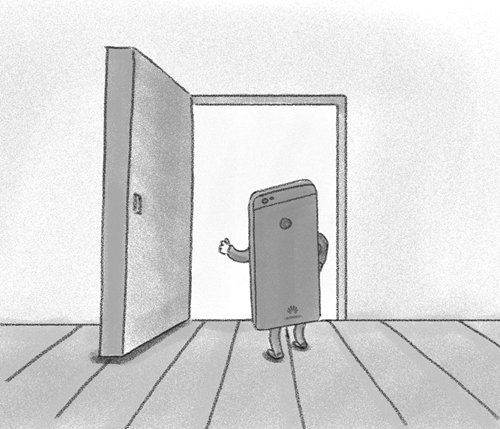HOME >> BUSINESS
Lifting Huawei ban can remove pressure on US firms, show goodwill to Beijing
By Zhang Jingwei Source:Global Times Published: 2019/7/22 21:23:40

Illustration: Xia Qing/GT
US President Donald Trump promised during the G20 summit in Osaka, Japan, to lift some of the restrictions his government had placed on Chinese telecom company Huawei.
However, international society does not believe that Trump will keep his promise. After all, saying-not-doing has become known as Trump's political modus operandi. Apparently, lifting bans on Huawei is not easy.
Huawei and China's supercomputer firms were included in the US Department of Commerce's "entity list" and are a measure of its technology war against China. The US seeks to suppress China's technological potential lest it surpass that of the US.
As China and the US reached a trade truce, the US partly lifted the Huawei blockade. US Commerce Secretary Wibur Ross confirmed July 9 that the government would issue licenses to companies selling US made products to Huawei with the premise of not posing a national security risk. The move was to "implement the president's G20 summit directive." Ross stressed that Huawei will stay on the blacklist. US companies must apply for licenses to sell their products to Huawei.
The partly lifted Huawei ban is roughly in line with Trump's commitment made in Osaka. Allowing US companies to provide devices to Huawei is due to external pressure rather than goodwill.
On the one hand, Huawei is a major customer of US tech unicorns including Intel, Qualcomm, Google and Apple. Cutting supply to Huawei hurts both sides. US tech firms will lose a major customer. Huawei has activated its backup plan: The self-developed HongMeng operating system has been under testing and will soon be ready for launch. Even though Huawei has been cut off from Android support and is losing a number of its overseas customers, it will manage to keep its large market in China. Huawei's ecosystem will likely rival Google's Android system.
On the other hand, allowing Huawei to access devices from US companies has tied it to the Android system, making the company a member of Bluetooth, SD and WiFi standards. US companies will continue to profit from globalization. Otherwise, they will shrink their own market. Right ahead of the G20 Osaka summit, hundreds of US companies urged Trump to resolve the trade conflict, remove tariffs and unblock Huawei.
The US partially lifted the Huawei ban because of the pushback created by Huawei's technological strength and competitiveness. US tech firms are also finding it hard to sustain the pressure. Trump's promise to allow companies to sell to Huawei is aimed at relieving pressure on American companies.
It is hard for the Trump administration to admit its failure to damage Huawei. The company is still on the blacklist with national security risks cited. A national security risk is a murky and political concept, widely used by the US in friction with its trade partners. US allies including Japan, the EU, Mexico and Canada are discontented. US credibility has plummeted.
China, which bears the harshest trade and technology war provoked by the US, has long had enough of this "national security" pretext. Partially lifting the Huawei ban hardly impresses Beijing. The negotiating teams of both countries have returned to engagement but it requires sufficient goodwill and sincerity to reach an agreement.
In the tech field, US attempts to slaughter Huawei have not stopped the company's 5G technology and equipment from gaining territory in the global market, nor has it knocked out Huawei's smart phone business.
Chinese and European telecom companies have achieved mutual benefit amid global 5G competition.
Under these circumstances, only partially lifting the Huawei ban does not solve any problem. The devices US companies sell to Huawei may not be what Huawei needs. The US can only push Huawei to expand the market and foster its own ecosystem and supply chains. US companies will inevitably lose this important customer.
To unblock Huawei, the US has to drop it from the blacklist and completely remove the ban. This will build mutual trust between the two countries. Starting from mutual trust, the two sides can negotiate a deal faster to the benefit of firms in both countries. The half-way unblock only reflects the pettiness of the US and damages its image.
The author is a research fellow with the Charhar Institute and a visiting research fellow with the Chongyang Institute for Financial Studies, Renmin University of China. bizopinion@globaltimes.com.cn
RELATED ARTICLES:
- Huawei Mate X foldable 5G phone receives license to hit stores in August: reports
- The US started trade war, but that doesn’t mean it can escalate the trade war arbitrarily
- Vote-hungry attitude toward trade war with China can be US’ Achilles’ heel
- Huawei says Hongmeng operating system not for smartphones
Posted in: EXPERT ASSESSMENT